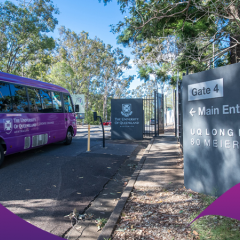Children are growing, learning, and connecting with swiftly evolving and ever-changing digital technology. With a vision to ensure young children grow up healthy, connected, and educated in a rapidly changing digital world, the Australian Research Council Centre of Excellence for the Digital Child (the Centre) is the world’s first research centre dedicated to creating positive digital childhoods for all Australian children.
Digital technologies are part of everyday life even for infants, toddlers, and pre-schoolers. While the narrative is often focused on “too much screen time” and “parent guilt” around children’s use of digital devices, digital technologies do offer many benefits, and the Centre aims to guide parents, professionals, and policy makers to ensure digital technologies result in safe, healthy, educated, and connected children.
 ARC Centres of Excellence are prestigious hubs of expertise through which high quality researchers maintain and develop Australia’s international standing in research areas of national priority. The Centre is a collective of national and international partners across education, government, business, and the community, all working together to achieve the Centre’s vision. Led out of QUT, the Centre has researchers from The University of Queensland (UQ), Curtin University, Deakin University, Edith Cowan University, and The University of Wollongong.
ARC Centres of Excellence are prestigious hubs of expertise through which high quality researchers maintain and develop Australia’s international standing in research areas of national priority. The Centre is a collective of national and international partners across education, government, business, and the community, all working together to achieve the Centre’s vision. Led out of QUT, the Centre has researchers from The University of Queensland (UQ), Curtin University, Deakin University, Edith Cowan University, and The University of Wollongong.
The Centre was established in 2021 with seven years funding from the Australian Research Council and whilst still in the set-up phase, expects significant outputs from 2022 to 2027.
ISSR hosts the UQ node of the Centre, leading and contributing to a number of key components of work. Current projects include:
World first Longitudinal Family Cohort Study
The centrepiece of the Centre is a 3000-family cohort longitudinal study aimed at understanding the role and ongoing effects of digital technology in the lives of Australian families and their children from birth to seven years of age. Capitalising on a 30-year track record of developing and conducting longitudinal cohort studies, ISSR researchers are currently leading the design of a study that will ultimately track 3000 families and their children.
This study has been designed to identify potential problems and unmet possibilities associated with digital technologies in early childhood and will build new understandings to help identify policy and practice ‘hot spots’ for detailed investigation, with the aim of informing solutions and opportunities for optimisation for the diversity of Australian children, their families and society.
Data will be collected via survey and digital capture.
Staying Connected: Educators, children and families maintaining connection through digital technology
In response to the COVID-19 pandemic, early childhood education and care (ECEC) services were required to innovate programs for remote learning and care that enabled children to stay connected and provide continuity of early childhood education. Many of the services developed continue to be offered as flexible or virtual learning experiences.
The Staying Connected study investigates these ECEC practice innovations to understand how early childhood educators, children and families are staying connected and experiencing learning during remote learning situations as a result of the COVID-19 pandemic. The key project outcomes will include:
- New knowledge about effective flexible learning approaches.
- Practice supports through the provision of practical strategies and exemplars.
- Policy solutions that can inform investment strategies to enhance, sustain, and maintain connection with ECEC for children when their on-site attendance is limited or disrupted.
The key purpose of the study is to identify the best mechanisms to support educators, children, and families at times when on-site attendance is limited or disrupted, and the learnings will also be paramount to informing future flexible ECEC program delivery.
The Topaz project
The Centre is strongly multidisciplinary, and the Topaz project is a Centre-wide activity that will support capacity building through reviews on digital technology and young children. This project will focus on undertaking high quality reviews and education and training in review methods, that include systematic reviews, meta-analyses, and narrative reviews of qualitative studies. 
A specific goal of the Centre is to provide authoritative, accurate, and practical advice to a range of users, that include children and families, educators, health system, industry bodies, policy makers, and others with a concern for the digital life of children. The Topaz project forms a significant component of realising this goal.
More information on the research activities of the Centre can be found here.
Term: 2021 - 2027
Team:
ISSR: Professor Karen Thorpe, Professor Simon Smith, Dr Sally Staton, Dr Laetitia Coles, Dr Sandy Houen, Dr Emma Cooke, Dr Cassandra Pattinson
The Centre: More information on all the Centre people can be found here.



